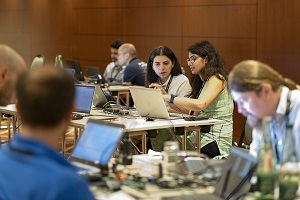MIPI I3C Interop Workshop claims to offer interoperability of multi-vendor devices

Piscataway, United States – The MIPI Alliance, an international organisation that develops interface specifications for mobile and mobile-influenced industries, announces the completion of a MIPI I3C Interop Workshop testing event in Munich.
The June 13-14 plugfest, which coincided with MIPI’s 60th member meeting, engaged 16 MIPI I3C/I3C Basic implementers from seven companies in a range of interoperability testing (from initial to advanced) for their innovations. Interoperability between multi-vendor controller and target devices was tested in a confidential environment with a mix of electronics manufacturers, including both MIPI members and nonmembers, illustrating a broad range of applications and a commitment to the MIPI I3C interface. Binho LLC, Intel Corporation, Introspect Technology, Prodigy Technovations Pvt. Ltd., Robert Bosch S.p.A., and STMicroelectronics were among the companies to participate in the workshop.
MIPI I3C is a scalable, intelligent utility and control bus interface for connecting peripherals to an application processor, giving developers unprecedented opportunities to craft innovative designs for an array of products – smartphones, personal computers, wearables, IoT devices, systems in automobiles and other devices. Designed as the successor to I2C, I3C incorporates key attributes of the traditional I2C and SPI interfaces to provide a high-performance, very-low-power solution with backward compatibility and a robust, flexible upgrade path.
The MIPI I3C specification is available to MIPI members, while the publicly available, royalty-free MIPI I3C Basic is a subset of I3C that bundles the most commonly needed I3C features for developers and other standards organisations. MIPI I3C Basic has been adopted into JEDEC’s sideband bus and DDR5 standards, and in June, MIPI and ETSI technical committee secure element technologies (TC SET) announced the adoption of I3C Basic as a physical and logical link layer for the ETSI Smart Secure Platform (SSP).
“Interoperability testing early in the design cycle is crucial to reducing time to market and ensuring seamless functionality among multi-vendor devices in deployment,” says Sanjiv Desai, chair of MIPI Alliance. “Events such as the MIPI I3C Interop Workshop are so important because they help companies optimise the manufacturability of their designs, avoid deployment issues and deliver higher-quality products upon which their customers can rely from day one.”
Additional plugfest opportunities are planned in conjunction with future in-person MIPI Alliance member meetings.
To keep up with MIPI Alliance, subscribe to the MIPI blog and stay connected by following MIPI on Twitter, LinkedIn, Facebook and YouTube.
Quotes from MIPI I3C Interop Workshop participants
“The MIPI I3C Interop Workshop provided us with an incredible opportunity to not only validate the technical implementation of our I3C Basic protocol analyser, but also to have a hands-on session with the experts working at the forefront of I3C. Getting their feedback was invaluable to further refine our solution,” says Jonathan Georgino, founder of Binho LLC. “The collaborative spirit among the workshop attendees was inspiring – engineers from industry competitors sitting down together to solve technical challenges will further advance widespread I3C adoption.”
“It was exciting to see everybody working together at the MIPI I3C Interop Workshop and solving problems creatively,” says Matthew Schnoor, debug architect with Intel Corporation. “I enjoyed being a part of the collaboration and providing support to plug-in questions or pointing out different specification sections to help participants find solutions.”
“Introspect’s team is always committed to driving MIPI specification development, and we were thrilled to participate at the member meeting in Munich this past June,” says Mohamed Hafed, Ph.D., CEO of Introspect Technology. “Contributing to the MIPI I3C Interop Workshop allowed us to verify the interpretations of the specifications along with our peers and their wide variety of devices. With a rich roadmap of specifications, we’re excited about the future of MIPI!”
“Time to market is the key for any company to make a space for itself in the fast-growing technology market, and interoperability testing is crucial to rectifying design issues at the initial phase of development,” says Brijesh A. Chandrala, senior technical lead with Prodigy Technovations Pvt. Ltd. “The MIPI I3C Interop Workshop helped us to verify our latest features and functionality with different companies at an early stage in a confidential environment. Participating in all of the MIPI I3C interop workshops since 2017 has helped us make our test and measurement products better and more accurate.”
“This workshop was a great opportunity to see how MIPI I3C is becoming an increasingly adopted protocol and also understand how much progress other companies have made in implementing it,” says Franco Alessandro Brucato, ASIC digital design engineer with Robert Bosch S.p.A. “But the best part was, without a doubt, working side by side with well-prepared colleagues from other companies and learning from them. I hope there are more events like this in future.”
“Interop plugfests are great for ensuring interoperability among new device prototypes from a broad range of vendors,” says Eyuel Zewdu Teferi, senior hardware design engineer with STMicroelectronics and vice chair of the MIPI I3C Basic Ad Hoc Working Group. “As the first in-person MIPI I3C activity in two years, it was highly anticipated and allowed us to exchange experiences with other companies involved in I3C implementation and validating solutions. STMicroelectronics brought several new products, and by validating our products with conformance test suite (CTS) solutions provided by other contributors, the products all successfully passed the interoperability tests. We eagerly anticipate future interoperability events and hope more attendees will join, as these events are now open to both members and nonmembers to help them validate their solutions by directly interacting with other I3C implementers.”
Comment on this article below or via Twitter @IoTGN
